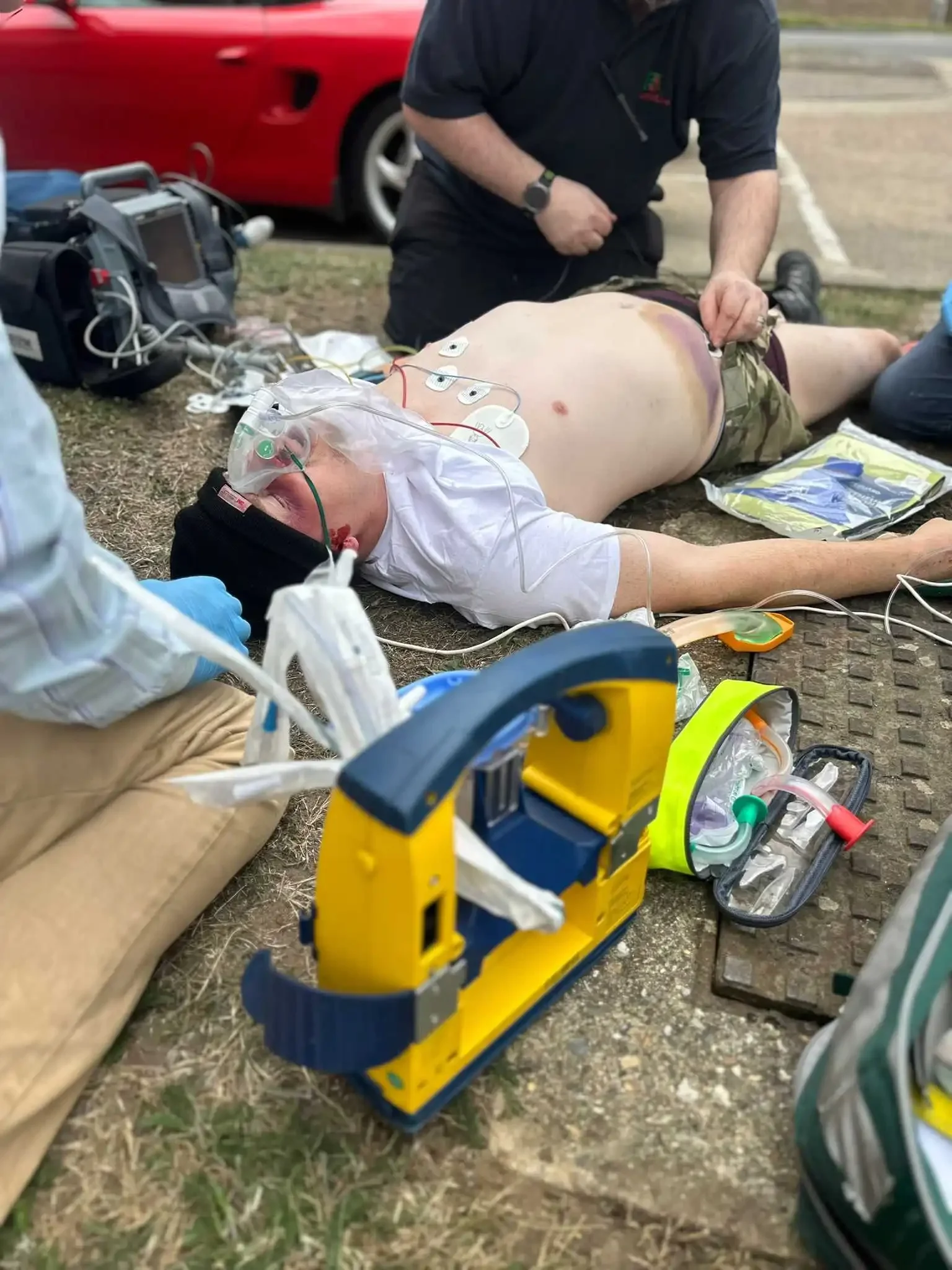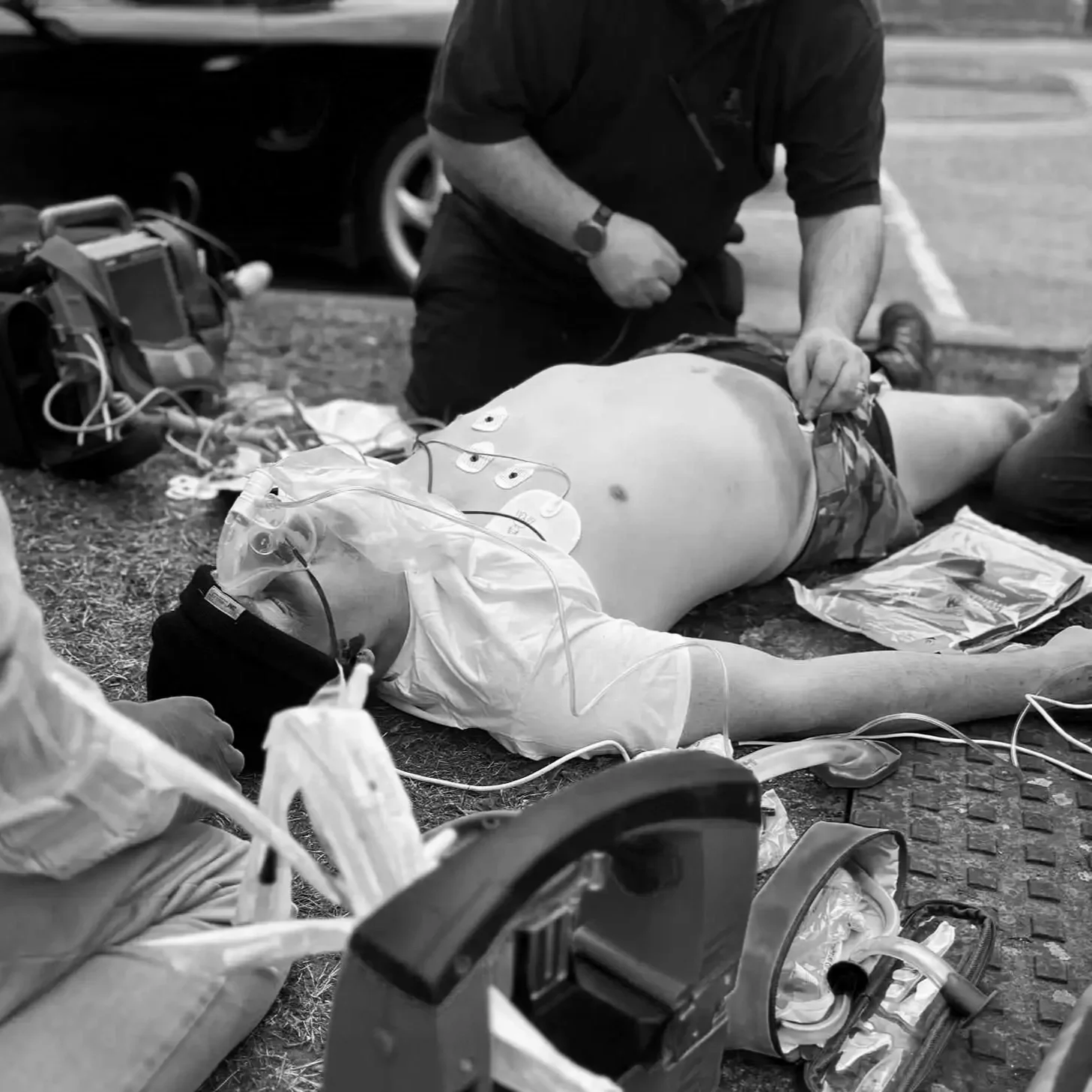
FREC 4 Course - Level 4 First Response Emergency Care
NORFOLK | SUFFOLK | ESSEX | CAMBRIDGESHIRE | KENT | LONDON
5 Days + Self Study
Explore This Course.
Pre Hospital Training > FREC 4 Course
FREC 4 Course Description
Advancing Your Skills in Emergency Care With FREC 4 in Suffolk & Norfolk.
Our FREC 4 course takes what you learned on FREC 3 and builds it up a level. It’s aimed at people who need to make clinical decisions, manage incidents, and take the lead in pre-hospital care — whether that’s on a frontline ambulance, at a public event, or in a high-risk workplace. The course follows national guidance from the Resuscitation Council UK, Skills for Health, and the Faculty of Pre-Hospital Care at the Royal College of Surgeons of Edinburgh.
What Makes Our FREC 4 Courses Different?
Are you passionate about making a significant impact in emergency and urgent care? This course is tailor-made for those seeking to expand their expertise in the NHS, private ambulance services, or specialised roles in the military, security, police, and fire services. It's a stepping stone for those dedicated to saving lives and providing care when it matters most.
Led by a team of paramedics and EMTs, our FREC 3 and FREC 4 Courses offer a wealth of expertise and real-world insights. With two instructors guiding each course, participants benefit from dynamic, realistic training scenarios that build practical skills and a thorough understanding of emergency care.
Our commitment to the highest quality training prepares learners to perform confidently under pressure.
If your business operates in a lower-risk environment, you might also consider our 1-Day First Aid Course or 3-Day First Aid Course, such as the Emergency First Aid at Work Course or our Comprehensive First Aid at Work Course. Or you might be interested in our FREC 3 Courses.
Open Courses
If you can’t make our next open course please get in touch and we’ll look to run our next course at a time and place that suits you.
FREC 4 Course Details:
How much does the course cost?
For individuals the cost of our FREC 4 Course is £520 + VAT. However, we offer discounts for group bookings.
What is the qualification?
The qualification is the Qualsafe Level 4 Certificate in First Response Emergency Care (RQF) commonly reffered to as FREC 4.
When is the FREC 4 course held?
We run several open FREC 4 courses throughout the year — you can view upcoming dates and book directly on our course calendar. If you’re booking for a group, we’re also happy to deliver FREC 4 at your venue anywhere in the UK whenever you need it. Just get in touch to discuss dates and what you need.
How long does the FREC 4 course take?
The full FREC 4 qualification involves more than just the 5-day classroom course. Learners need to complete 20 hours of pre-course study, plus 118 hours of CPD before attending. After the face-to-face training, you’ll also complete three post-course workbooks, which you have up to 12 months to finish and get signed off.
Where is the FREC 4 course delivered?
Open courses are normally run in Bury St Edmunds Suffolk. However for group bookings we can and do travel to your venue anywhere in the UK and even abroad.
Do I need previous experience?
A valid Qualsafe Level 3 Award in First Response Emergency Care (RQF) or equivalent is your gateway. However if you have some other experience you may be able to go straight to FREC 4. For example if you’re a year 2 student Paramedic you do not need to do FREC 3 first. If you have any questions feel free to get in touch.
What does the FREC 4 course cover?
Rich Learning Experience: The full qualification takes around 180 hours. That includes 20 hours of pre-course study, 118 hours of CPD, five days of face-to-face training, and post-course workbooks.
Engaging Content: The course is made up of one unit, broken into three straightforward parts — all focused on building useful, real-world skills.
Flexible Completion: You’ve got up to 12 months to finish the course, including your workbooks and any referrals if needed.
What will I need to do to prepare for my FREC 4 Course?
Firstly, you’ll need to hold a current FREC 3 qualification or equivalent. Next, leading up to the FREC 4 course, you’ll need to submit evidence of 118 hours of continuous professional development (CPD). The 118 hours of CPD need to be varied, clinically relevant and can include the following:
Reading & Studying
Teaching
Operational Duties
Attending Conferences/Webinars/Training Days
What’s covered on the FREC 4 course?
The Level 4 Certificate in First Response Emergency Care (FREC 4) covers a comprehensive range of topics essential for advanced emergency care practitioners. Here's an overview of what's covered:
-
Component 1
Component 1 of the Level 4 Certificate in First Response Emergency Care (FREC 4) focuses on "Patient Assessment and Management". This component addresses various crucial aspects of initial patient assessment and effective management of different health conditions.
-
Component 2
Component 2 of the Level 4 Certificate in First Response Emergency Care (FREC 4) is titled "Emergency Trauma Care". This component delves into various critical aspects of managing trauma and understanding key body systems in the context of emergency care.
-
Component 3
Component 3 of the Level 4 Certificate in First Response Emergency Care (FREC 4) is focused on "Focused Emergency and Urgent Care". This component covers a diverse range of topics crucial for providing comprehensive emergency care.
What’s the FREC 4 assessment like?
The assessment’s are split across the course and what you do afterwards — it’s a mix of practical work, written exams, and three post-course workbooks.
During the course, you’ll be assessed on trauma care, Immediate Life Support, and key skills like taking observations, assisting with clinical procedures, and using immobilisation kit. You’ll also sit two short written exams — one on ECG recognition and one on anatomy and physiology.
After the course, you’ll complete three workbooks, one for each part of the qualification. You’ve got up to 12 months to get everything finished and signed off — including any referrals if needed.
FREC 4 FAQs
-
You’ll need to be 18 or over and have either a valid FREC 3, a recognised equivalent qualification, or relevant experience that meets the entry criteria. We’ll ask to see some evidence of that before the course. You should also be reasonably confident with written work — roughly equivalent to Level 2 literacy. If you’ve got a background in first aid or emergency care, that’ll definitely help.
-
Most people will need to complete FREC 3 before moving on to FREC 4 — it’s the usual route. That said, if you’re a second-year paramedic student, a CMT 1 combat medic, or have NHS training at ECA level or above, you might be able to go straight in.
If you’ve done FPOS or RTACC, you won’t need to start from scratch — you can do a 2-day FREC 3 RPL conversion first, then progress to FREC 4.
If you’re new to medical or pre-hospital care, you’ll definitely need to start with FREC 3.
-
The full FREC 4 qualification takes around 180 hours to complete. That includes 20 hours of pre-course study, 118 hours of CPD, five days of face-to-face training, and three post-course workbooks.
The course itself is one unit, broken into three parts, covering patient assessment, trauma care, and focused emergency and urgent care. You’ve got up to 12 months to complete everything — including any referrals if needed.
-
FREC 4 goes well beyond the basics. You’ll cover things like detailed patient assessment, trauma management, ECG interpretation, airway care, and using medical gases safely. You’ll also look at how to manage emergencies involving children, mental health, sepsis, respiratory conditions, and childbirth.
There’s a strong focus on clinical decision-making — and you’ll also learn how to assist with interventions like cannulation, IO access, and more advanced procedures in a supporting role.
-
FREC isn’t a direct route to becoming a paramedic — but it can be a great starting point. Most paramedics either go to university to study Paramedic Science or work their way up through the ambulance service as an EMT or Level 4 Associate Ambulance Practitioner before topping up with a degree.
That said, FREC 3 and FREC 4 are solid foundations. They give you practical, hands-on skills and a good understanding of pre-hospital care. They’re ideal for getting experience in event medicine or working alongside other clinicians — and they look great on university or job applications.
At the moment, the highest level in the FREC route is FREUC 5 (Level 5 First Response Emergency and Urgent Care). If you’re aiming to become a registered paramedic, you’ll still need to go through an HCPC-approved degree programme — but FREC is a strong way to build up the skills and confidence to get there.
-
You’ll be assessed through a mix of practical tasks, skills tests, written exams, and post-course workbooks. We’re looking at how you apply what you’ve learned — not just what you can memorise.
To pass, you’ll need to meet the standard in every area. That includes the practicals, the written papers, and all three workbooks. It’s a pass/fail system, and everything has to be passed individually — no averaging out.
-
FREC 4 opens the door to more advanced roles in pre-hospital care. It’s recognised by NHS ambulance services, private medical providers, and specialist teams like fire, police, and military medics.
It’s also a solid next step if you're working towards higher qualifications, like FREUC 5 or a paramedic degree. Even if you’re not going that route, FREC 4 builds the clinical confidence and credibility that employers are looking for in emergency care roles.
-
FREC 4 doesn’t technically expire, but you’ll need to keep your skills current to stay clinically credible. That means ongoing CPD and an annual Immediate Life Support (ILS) refresher.
We’re also launching a CPD portal for FREC 4 learners soon — with regular updates and pre-hospital care content from our paramedics and EMTs — to help you stay sharp after the course.





